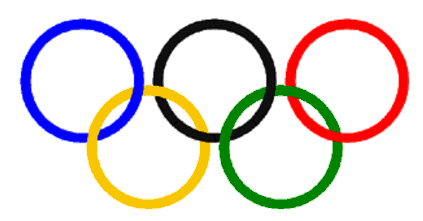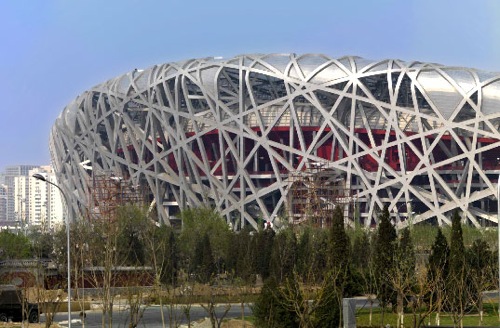The silver, steely dome can be picked out of Beijing's skyline from miles away. It is the building where the 2008 Olympic Games opening ceremonies were held August 8th.
The Olympics. Ah. Nothing is more entertaining, more riveting, more awe-inspiring and . . . sweaty. For the few of you who don't know, the summer Olympics are being held in Beijing, the capitol of China.
I'm quite surprised; actually, that someone hasn't written an article on the games before this. The Olympics are, after all, a huge event, with many, many countries from around the world partaking.
So that is what I'm here to do today. To give you everything you wanted to know about the Olympics, the sports, the athletes, past and present Olympic Games. Yeah, I know, try not to hyperventilate.
What are the Olympic Games?
"The Olympic Games is an international multi-sport event subdivided into summer and winter sporting events. The summer and winter games are each held every four years"
Those two sentences about sum it up. Many countries hold their own competitions and trials for their athletes to see who is good enough to represent them in the sporting events of the Olympic Games, which are held every four years in a different location.
There are bronze, silver, and gold medals handed out to the three best athletes in each event. Millions view the games over the television world wide, some catch replays on the Internet, others even get to go see the actual Olympic Games in the hosting city.
The Olympic Games is an enormous project, requiring billions of dollars, pain, sweat, blood and tears, all so we can see who is the best of the best.
History of the Olympic Games
The first Olympic Games were held in Greece, and were first recorded to have taken place in 776 B.C. It is believed that they were first held to honor the Olympic God, Zeus. They took place until AD 393.
It was only in 1833 did anyone have interest in reviving the Olympic Games. This man was named Panagiotis Soutsos. He was a poet and newspaper editor in Greece. Panagiotis's brother, Alexandros, is most known for founding the Greek Romantic School of Poetry.
Then Evangelos Zappas, businessman and philanthropist, sponsored the first modern Olympic Games in 1859. They were held in a square in Athens, Greece. Mr. Zappas died shortly after, but because of his large fortune he left, the Olympic Games were in 1870, and then again in 1875 at a stadium in Athens called the Panathenian.
For an event as massive as the Olympics, there needed to be some organization. That's why the International Olympic Committee was founded in 1894, with it's base in Lausanne, Switzerland. The IOC is responsible for organizing both the summer and winter Olympics.
The committee was created by Pierre de Coubertin and Demetrius Vikelas. Pierre was a French historian and Demetrius was a Greek businessman and writer. Along with founding the committee, he also became it's first president, from 1894 to 1896. The first Olympics the IOC coordinated were the 1896 Summer Olympics, held in, again, Athens, Greece. Although there were only 250 athletes participating, it was still a success. They held the second summer Olympics in Paris, France. It was the first time that women were allowed to compete in the games.
For more than a hundred years, the 205 members on the International Olympic Committee has set up many both summer and winter Olympics in beautiful cities across the globe. From Athens to Beijing, the Olympics' history sure is a bright one.
Olympic Cities
The Olympics have been held in many, many different cities across the Earth, rarely in the same place. Maybe they even happened in your city or a city near you, and you didn't even know about it! Here's a list of some, not all, of the cities that have hosted either the summer or winter Olympic Games over the years.
Summer Olympic Games:
1896 - Athens, Greece
1900 - Paris, France
1904 - St. Louis, Missouri, USA
1906 -Athens, Greece (sometimes called the "interim Games")
1908 - London, England (Great Britain)
1912 - Stockholm, Sweden
1916 - Canceled - World War I (Scheduled for Berlin, Germany)
1920 - Antwerp, Belgium
1924 - Paris, France
1928 - Amsterdam, The Netherlands
1932 - Los Angeles, California, USA
1936 - Berlin, Germany
1940 - Canceled, World War II (Scheduled for Tokyo, Japan. Then re-scheduled for Helsinki, Finland & canceled a 2nd time)
1944 - Canceled, World War II (London considered, but war continued)
1948 - London, England (Great Britain)
1952 - Helsinki, Finland
1956 - Melbourne, Australia and Stockholm, Sweden (Horses were not permitted to be imported into Australia so the Equestrian events were in Stockholm)
1960 - Rome, Italy
1964 - Tokyo, Japan
1968 - Mexico City, Mexico
1972 - Munich, Germany
1976 - Montreal, Canada
1980 - Moscow, Soviet Union (USSR)
1984 - Los Angeles, California, USA
1988 - Seoul, South Korea
1992 -Barcelona, Spain
1996 - Atlanta, Georgia, USA
2000 - Sydney, Australia
2004 - Athens, Greece
2008 - Beijing (also known as Peking), China
2012 - London, England (Great Britain)
Winter Olympic Games:
1924 - Chamonix, France
1928 - St. Moritz, Switzerland
1932 - Lake Placid, New York, USA
1936 - Garmisch-Partenkirchen, Germany
1940 - Canceled due to World War II (Scheduled for Sapporo, Japan. Then re-scheduled for Garmisch-Partenkirchen and canceled a second time)
1944 - Canceled due to World War II
1948 - St. Moritz, Switzerland
1952 - Oslo, Norway
1956 - Cortina d'Ampezzo, Italy
1960 - Squaw Valley, California, USA
1964 - Innsbruck, Austria
1968 - Grenoble, France
1972 - Sapporo, Japan
1976 - Innsbruck, Austria
1980 - Lake Placid, New York, USA
1984 - Sarajevo, Yugoslavia
1988 - Calgary, Alberta, Canada
1992 - Albertville, France
1994 - Lillehammer, Norway
1998 - Nagano, Japan
2002 - Salt Lake City, Utah, USA
2006 - Torino, Italy
2010 - Vancouver, British Columbia, Canada
2014 - Sochi, Russia
There you have it. Beautiful, exotic cities dotted across the globe.
Getting Ready for the Olympics
Most people can't wrap their minds around exactly how much money and preparation and work (the Olympics created 600,000 jobs) goes into getting ready for the Olympics. Take the coming up Olympics for example. There are going to be 28 sports and 302 events. 205 countries alone. Hundreds and hundreds and hundreds of athletes.
Many cities love hosting the prestigious Olympics, but pride isn't the only thing driving them. The Olympics bring in millions of dollars and countless tourism. It shows off their city to the world.
Still, hosting the Olympics is a ton of work. New stadiums, new buildings, nw gymnasiums, new pools, new tracks, new courts are built in ever city, and it can get expensive, fast.
In fact, the IOC, in October, 2007, raised the 2008 Olympic budget from $1.6 billion dollars (US currency) to $2 billion. At that time, 27 of 37 venues had been completed.
The Summer Olympics, 2008: Beijing
The International Olympic Committee was hesitant in letting Beijing take over the 2008 Olympic duties, but China is confident. They say that the 2008 Olympics will be 'reintroducing China to the world'.
I visited Beijing August, 2007, and fell in love with the city. For having a population of about 15 million people, my family and I found the parts of the city we visited extremely clean and pretty. I grew up in a big city, so I loved Beijing. I loved the architecture (Although my Dad complained it was becoming like every other big city in the world: Towering and glass-like.), the outdoor markets, the restaurants, and the people. Even with the language barrier, I found the people very friendly and helpful. I'm excited for all the spotlight the city is getting from the upcoming Olympics.
There were some issues, although, with letting Beijing host. One was China's strict government. Some people don't agree with what China is doing with Tibet, and boycotted the Olympics. Air pollution was another. Even the clearest days feel cloudy under the smog. China's government is working on it, although. The government is restricting cars and factories to get the pollution down to a "tolerable level before the Olympic Games". 3.3 million vehicles are expected to stay off the roads during the Olympics, which run from August 8th to August 24th.
Another problem is traffic congestion. Especially with all the tourism coming into Beijing, controlling traffic will be a big issue for the city.
Even with all of this, many are confident that Beijing will be a fantastic host city for the 2008 Summer Olympic Games. It's a unique, cultural and beautiful city. I speak from personal experience.
The Olympic Games. They represent tradition. Excellence. Power. The best athletes from around the world. They represent time and money and triumph. And we get to experience all of that this year, whether it's from behind our television screens, reruns on Youtube . . . or the lucky few who get to be at the Games themselves.
The Olympics are here.
The Olympic Rings


Glitsygrl
Author's Note: Sources: http://www.harveyabramsbooks.com/hostcities.html
http://en.wikipedia.org/wiki/International_Olympic_Committee
http://www.washingtontimes.com/news/2008/jul/19/beijing-to-begin-pollution-purge/
http://history1900s.about.com/library/weekly/aa081000a.htm